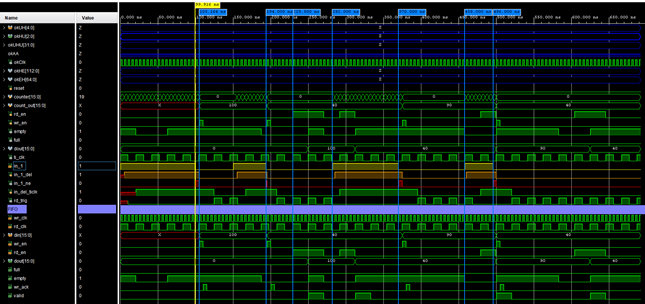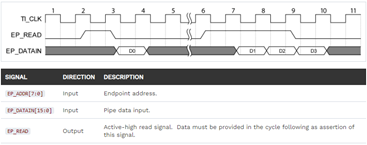I am trying to run Vivado's implementation on my design but I am getting this error: [DRC MDRV-1] Multiple Driver Nets: Net pipea0/ep_read has multiple drivers: pipea0/ep_read_INST_0/O, and rd_en_reg/Q. When I was running synthesis, I got an error saying that I could not connect .ep_read to the register rd_en. I think this error was coming from rd_en being a register when it should have been a wire so it could be instantiated in the okPipeOut module. In order to fix this I tried to create another wire called rd_en_connect and then I assigned my rd_en register to that wire.
I now think that the implementation error I am getting is the same error I was getting during synthesis. I am not sure how to fix this error since I need rd_en to be a register. Is there a simple way to fix this error? If not, how can I keep the same functionality but define rd_en as a wire?
In brief, I am using a counter to measure the pulse width of an incoming signal (in_1) and then multiply the counter output by the clock period to get the pulse width with respect to time. I am then using Vivado's FIFO generator with separate write and read clocks to cross the clock boundary between the FPGA and my PC so I can see the pulse measurements in an output file. Modules okHost, okWireOut and okPipeOut are all preloaded modules that come with my FPGA.
`timescale 1ns / 1ps
module Pulse_counter(
input in_1 , // input signal
output reg [15:0] count_out, // output of the counter
input [4:0] okUH, // Input from Opal Kelly USB controller (from PC)
output [2:0] okHU, // Outputs to Opal Kelly USB Controller (to PC)
inout [31:0] okUHU, // Bidirectionals to USB Controller
inout okAA
);
wire okClk; // Clock used synchronize FPGA to the Opal Kelly modules (?)
wire [112:0] okHE; // Opal Kelly module address and control bus
wire [64:0] okEH; // Outputs from the various OK modules back to the okHost core
wire reset;
reg [15:0] counter;
reg rd_en;
wire rd_en_connect;
reg wr_en;
wire empty;
wire full;
wire [15:0] dout;
wire wr_ack;
reg in_1_del;
wire in_1_ne = !in_1 & in_1_del; // Negative edge of in_1
reg in_del_ticlk;
wire rd_trig = !in_del_ticlk & ti_clk; // Write enable trigger
assign rd_en_connect = rd_en;
initial counter = 16'b0;
initial wr_en = 1'b0;
initial rd_en = 1'b0;
fifo_generator_0 myfifo (
.wr_clk(okClk), // input wire wr_clk connnected to the Opal Kelly FPGA clock
.rd_clk(ti_clk), // input wire rd_clk connected to the USB's clock
.din(count_out), // input wire [15 : 0] din connected to the pulse measurement
.wr_en(wr_en), // input wire wr_en
.rd_en(rd_en), // input wire rd_en
.dout(dout), // output wire [15 : 0] dout
.full(full), // output wire full
.empty(empty), // output wire empty
.wr_ack(wr_ack), // output wire wr_ack confirms that a write request succeeded during the last write clock
.valid() // output wire valid indicates valid data is available on output bus (dout)
);
okHost okHI(
.okUH(okUH),
.okHU(okHU),
.okUHU(okUHU),
.okAA(okAA),
.okClk(okClk),
.okHE(okHE),
.okEH(okEH)
);
okWireIn endpoint00(
.ep_addr(8'h00),
.okHE(okHE),
.ep_dataout(reset)
);
okPipeOut pipea0(
.okHE(okHE),
.okEH(okEH),
.ep_addr(8'ha0),
.ep_read(rd_en_connect),
.ep_datain(dout)
);
always @(posedge okClk) begin
if (reset || counter==16'hFFFF) begin
counter <= 16'b0 ; // If reset is high reset the counter to 0
end
else if (in_1) begin
counter <= counter + 1; // As long as input is high keep counting
end
else if (in_1 == 16'b0) begin
if (counter !== 16'b0) begin // Without this block the output was set to the counter
count_out <= 5*counter; // value for only one clock cycle before it was reset back to zero
end
counter <= 16'b0; // Reset counter once the input signal returns back to zero
end
end
always @(posedge okClk) begin
if (reset) begin
in_1_del <= 1'b0;
end else begin
in_1_del <= in_1; // Delayed input signal by one okClk cycle
end
end
always @(posedge okClk) begin
if (reset || full) begin
wr_en <= 1'b0;
end else begin
wr_en <= in_1_ne; // Assign the write enable to the negative edge of in_1
end
end
always @(posedge ti_clk) begin
if (reset) begin
in_del_ticlk <= 1'b0;
end
else begin
in_del_ticlk <= in_1_del; // Delay the delayed input signal by one ti_lk cycle
end
end
always @(posedge ti_clk) begin
if (reset || empty) begin
rd_en <= 1'b0;
end else begin
rd_en <= rd_trig; // Assign read enable to its trigger
end
end
endmodule
Here is a simulation result I got before I had to add the rd_en_connnect wire.


